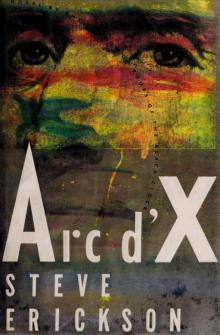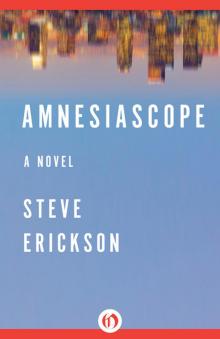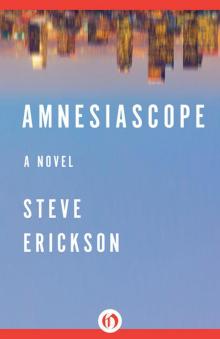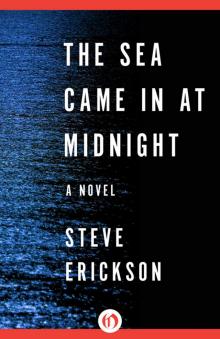- Home
- Steve Erickson
Days Between Stations Page 9
Days Between Stations Read online
Page 9
By the time he was sixteen and Janine was thirteen, he felt like a caged animal. She had enough of her mother’s brownness to glow there in the hallways at night, when she walked bare into the bath of gaslight from beyond the corridor beams. Sometimes she came to see him when she was lonely; she didn’t notice the way he cowered by the wall staring at her. She blithely laughed at her own sentences, occasionally glancing at him carelessly in order to acknowledge she wasn’t talking to herself. Lulu didn’t know what to do with her; she noticed the way Monsieur Monsieur’s son looked at her when the father brought him to the house. She contrived secret plans to smuggle the girl somewhere else, beyond the reach of the men who came here. She didn’t dare share these plans with the other women; the fact of the matter was Monsieur Monsieur owned Janine as he owned Lulu, and what the mother considered for her own daughter was dangerous, a breach that could never be justified; this was more than simply relations, this was a matter of property.
Monsieur Monsieur’s son, called Jean-Thomas, was almost thirty, though he seemed younger; not a line of maturity graced his face. He was good-looking in a somewhat offhanded and vacant way, and always well dressed. The women of Number Seventeen loathed him. Monsieur Monsieur had begun bringing Jean-Thomas some years before, when his own capacity for love-making had shown signs of diminishing. In this sense the master now kept the house for his son; and just as there was a generational transition between the two men, so there was among the women, older ones suddenly, inexplicably changed for newer ones. Where the older ones went Adolphe never knew. Where the new ones came from he didn’t know either. The number of women, excepting Janine, was always kept at eight.
Janine, nonetheless, was clearly the one Jean-Thomas watched with transparent lust—though not transparent enough for the father to see it. Had he realized his son wanted his daughter, and a daughter only thirteen years old at that, he never would have brought Jean-Thomas again. The women saw it with a sort of heart-stopping clarity, but had no idea how to tell the father. Lulu saw it each time Jean-Thomas arrived at the house, sometimes with his friends. After manhandling whatever women he selected for the evening, Jean-Thomas would sit in Number Seventeen’s foyer watching Janine.
Even Adolphe saw it, from around corners and through peepholes. Growing up in this room he was left to perceptions and insights that developed in isolation from the rest of the world; in this way some of his understanding was stunted, undeveloped. In other ways his understanding became keener, even extraordinary; in this room he learned to peer past everything that was immediate to and readily grasped by others. While other people’s comprehension of things developed in a manner that was linear, his own comprehension became circuitous, spiraling, lifted and carried in patterns of its own by hidden currents, like the light in this room. Absolutely blocked off from any access to the outside, the room nevertheless had a light that was from no lamp or candle, and sitting on his bed he could see the dust rise from an unknown breeze. Nothing else stirred this room; its various clocks and bottles and figurines had been here when the room was discovered and could well have been, indeed were assumed to have been, here since the house was built. There were even two flintlock pistols on the wall, crossing each other. The light was the same Adolphe had seen in the street, on the rue de Sacrifice, moments after the sun set beyond the river, when the sidewalks were filled with men passing among the Houses of Unwoken Dreams, Number Five and Number Twelve and Number Twenty-six—always eying the forbidden Number Seventeen to which few were ever admitted. Adolphe himself would walk past the bals musettes and the other clubs, the houses marked Belles Chinoises and Belles Negres, and the nude artists’ balls where rich Parisian debutantes could dance with tall muscular Africans, and well-to-do stylish gentlemen with other gentlemen. The light on the street at this hour, just as the rue de Sacrifice came alive, was a swirling smoky mix of the dusk from the river and the gaslamps only now beginning to smolder. Sneaking back to Number Seventeen at dark, Adolphe found the light in his room the same as the light from the street. On into the night this light persisted, and on the gray walls Adolphe watched a hundred shadows from the years this house had stood. When he placed a candle on the shelf across the room from him and lit its wick, he came to realize that in fact everything he saw was a flat surface, like a screen—that in fact dimension was an illusion. Everything was a flat surface and the pinpoints of light, whether from a candle on the shelf or a gaslamp above the street, were punctures in that surface—gashes made by somebody behind the screen. He realized then that beyond everything he saw there was an entire realm of blazing sunfire, and that colors were only the silhouettes of people in that realm—walking, eating, dancing, doing whatever they were doing behind the screen. It astonished Adolphe that everyone failed to realize they were just figures on a tapestry, the shadows of something else. He was therefore amused by the conceit of women, for instance, who admired the creamy color of their skin when in fact it was only the haze of some other woman behind the vast screen staring into a mirror. Adolphe could explain all of this to himself in this way, but he could not explain Janine: Janine wasn’t the same as the others. Janine was like their mother; and Adolphe decided that Lulu was from this place beyond the surface, and she had, perhaps when she was a little girl, slipped through. Adolphe wondered why Lulu hadn’t told them about this, and then realized she probably would when she thought they were old enough to understand it. He could see it wasn’t something one would tell a child too soon. But on that particular night, Adolphe wanted to tell Janine, when she came hiding from Jean-Thomas. He watched her huddling there in the dusk of the room. What is it? he said.
Monsieur Monsieur’s son, she said.
Beyond the walls of the room they could hear his voice calling her. Having decided to wait no longer, he became louder and louder, crashing around in the other rooms; Janine and Adolphe could now hear the other women’s voices. There was a furor. As always, Janine was only barely aware of Adolphe, her large brown eyes directed intently at the disguised door, her breath caught in her throat. Adolphe’s breath was caught as well, but for different reasons. Rather, he was feeling something dark inside him, spreading like ink from the ventricles of his heart; and he knew he wanted her too, the way Jean-Thomas did. He couldn’t reconcile himself to feeling this way, because he knew the darkness was only a shadow cast by someone else on the other side of the screen. He crawled toward her, carefully, and as he reached toward her shoulder, as the shadow of his hand stretched across the wall and he reassured himself it wasn’t his hand at all, as she then turned to him finally and saw, instantly, in his eyes, what had been there all along, and as she acknowledged it in a way that seared his memory forever, then the door-in-disguise burst open and Monsieur Monsieur’s son stood there looking at them.
There was something askew about him; his features seemed lopsided in the way his hair fell across his forehead, and the way his face was wet. His eyes darted around the room with vague amusement, and the clothes he wore, those of the young dandy, were disheveled. He looked at the girl and then at the boy, smiled drunkenly. Who are you? he said to Adolphe, who didn’t answer. Jean-Thomas didn’t really care. He reached over and took Janine by the wrist and pulled her to her feet. “You can’t take her,” said Adolphe, in an even voice.
“Why not?”
“I’m her brother.”
Jean-Thomas looked at Adolphe, distantly baffled, and then laughed. “Really?” he said. “So am I.”
Adolphe remained crouched on the floor looking in Jean-Thomas’ eyes, which regarded him one last fleeting moment before turning with the girl and disappearing from the light.
From that light, which belonged to the room itself, to the sound of Jean-Thomas’ steps as they moved to a room somewhere above him, to Janine’s cries in the stairwell of the house, Adolphe watched the light change, move, travel across the room. And when he heard the door close, and could feel the ripple of the ceiling from the thump of the bed as she was thrown across it, he sa
w the light fall, until the sight of it seemed to hum in his head. He told himself to go. He told himself that he couldn’t wait anymore, that there was nothing after all that physically held him—no bolt was on the door, no key was in a lock. He could reach for the door, fling it open as Monsieur Monsieur’s son had done, and be free of the room forever, the way Monsieur Monsieur’s son was apparently free of rooms and could, unlike other men, travel between them at will, dragging a woman behind him rather than following one before him. But Adolphe was held there. He was there on two knees and one set of five fingers, the other hand still reaching for her shoulder. Only now the shadow of it was gone, and he knew that behind the flat surface, someone had moved. He knew that just as he could travel from room to room at will, he wasn’t subject to the shadows of those behind the screen, that he could fling his own shadow away from any light, or grasp it in his hands and lock it away. There was no other issue then but courage; and he watched the door; and he listened to her above him as Monsieur Monsieur’s son had her, the legs of the bed jumping across the ceiling. He was dismayed by how silent she was, and how loud Jean-Thomas was: it was something that, years later, he would remember indelibly, never allowing an utterance to leave his lips when he made love to a woman, and silently ravaging her until she screamed. He would never make love to a woman who didn’t cry out, because of that night; he would never allow himself the moan of climax, because of that night. With every crash of the bed upstairs into the walls, with every sound of the ceiling reverberating from their movements, the light continued to ebb within the room, every color muted and every shade reduced to chiaroscuro: the effect was alternately stark, and like smoke. Nothing, he thought, could have moved him from the room, until he heard the one sound he never expected. He heard her laugh. Breathless and expectant. The slightest betrayal, and the sound of conquest.
That was when he bolted. He pulled the door open, ran through the hallways he had never run at night, past men looking up at him in bewilderment and the faces of women he knew so well, but who he’d never seen look quite like this: wet mouths and eyes like rivers; up the stairs hearing them call his name below, throwing open the door of one room, then another, interrupted couples in his wake, until at the final room down the hall he found the two of them. Jean-Thomas never turned around to look at him, too lost as he was in his grinding. But Janine looked up, to see Adolphe, small for his sixteen years, pull Jean-Thomas away from her and push him through the third-level window.
And because the rush was over, then there was that false sense of everything halted: Janine and Adolphe were both at the window looking out over the street, where Jean-Thomas lay. A crowd of men ran over, and Janine pulled Adolphe away. She watched the scene below and listened to the excited voices. She could see Jean-Thomas move, slightly, in the dark. The room was filled with the other women. Adolphe stood back by the wall, thinking, as they stared into the street.
Slowly they turned to him. He stared back at them. Lulu was in the doorway, looking like a dead woman. He’s still alive, said one of the women by the window: the flurry of voices rose from outside. Adolphe stared at the floor. You have to leave, said Lulu. The madam of the house rushed into the room, looked at the women, looked out the window at Jean-Thomas below, looked at the women again, then at Adolphe. He has to leave, said Lulu again, to the madam. She was speaking as though he was actually her son.
He left. The women got some money together, and one of them gave Adolphe the address of a friend in Tours. Adolphe left by the back, as he had always done when he was escaping this house. As he had always done when he was escaping this house, he went through the courtyard; he never stopped to take it all in one last time. He would have taken Janine but he kept hearing her laugh. Finally, on the highway south out of Paris, Number Seventeen and its unknown room were behind him.
He went to war not long after that. The soldiers picked him up by a stone bridge over a small stream, on the road to Tours; there was not a sixteen-year-old boy who wasn’t in the war. He gave his name as Adolphe Sarre. The troops debated among themselves whether the small Adolphe Sarre was sixteen or not; when he said he wasn’t sure, they enlisted him on the spot. All of them were going to Verdun; soldiers went in waves. Winter came. The soldiers built bonfires in the opened bellies of dead horses, and draped themselves on the hot barrels of recently fired cannons. When the food was gone they sat in the trenches gnawing at the chrome of their rifles. As he had in the room at Number Seventeen, Adolphe stared at the lights exploding in the sky pulled taut across the horizon: bombs left the sky in tatters, large gaping holes of light showing through. By the following year the siege was over and the French were marching to Lorraine. By then Adolphe seemed to feel nothing, too mesmerized by the light. One final gash in the clouds left him blind; they carried him on a stretcher into the ward of the wounded, and left him propped on a cot. He heard nurses’ voices talking to him, but saw only white; in his mind he pictured the faces of the women of Number Seventeen, and to each voice that he heard he attached a face. There was no voice for Janine, there was no laugh that approximated Janine’s laugh. After a while, there in the ward of the wounded, he began drawing his own lines on the white; he formed his own shapes. To each shape he called her name, and heard her laugh in return. He traveled, in this mesmerized state, between deep doubt and awed exhilaration: his instincts and understanding amazed him, and left him alone. At some point the white faded to gray; he thought he was losing the vision. One morning he woke and everything was dark; he thought he had lost the vision. He thought that he’d never see again through the surface of things. This went on for a week, two weeks, during which he sank into despair, until one afternoon he heard a terrific bomb overhead, the blast of which seared a hole right in his own darkness. At that point, he peered through the hole and still saw bonfires lit in the bodies of gutted dead animals, and men eating their rifles. He realized then that what was behind the screen was no better than what was before it, and there was no purpose to waiting for the moment when he could step through, to where he always figured he rightly belonged, as he always planned to someday do. He realized that carnage was carnage, defeat was defeat, and the dead would always die, and nothing was better over there, nothing was different. At that moment he grew up. At that moment he seized, somewhere inside him, the essence of what would drive him later: his drives were only awaiting some form to take. After that he went to sleep. The nurses couldn’t wake him for weeks; to the doctors his coma appeared indefinite and probably unending. It wasn’t until the eleventh hour of the eleventh day of the eleventh month of that year, at the very moment the Armistice was being signed, that he opened his eyes and could see again.
When Marshal Foch led the victorious French troops into the city, it was Adolphe Sarre’s first real vision of Paris, having only seen before the rue de Sacrifice and a few outlying alleys. It never occurred to him, walking in the streets with the rest of the soldiers as the crowds cheered wildly, that the facades of the buildings were constructed from the ground up; rather he assumed the city had been formed like a canyon, centuries of rain and fire carving it out of the ground, and the river running through the canyon’s core. He couldn’t imagine that the Grand Palais overlooking the Seine was the invention of the same sort of living beings that lay dying and butchered on battlefields just kilometers away. Had he known this before going to war, he might have felt more compassion and revulsion and sense of misery for the wounded and dead; he might not have been so readily fatalistic. It was amazing to him to see men happily standing along the streets rather than in rooms or trenches; it was amazing to him to see women who were old and plain rather than beautiful and rouged and young. The citadels of Paris rose like chiseled cliffs and the windows glittered like caves in which fires had been set and stoked—small gouges in the screen, their distance an illusion.
In his uniform, he had only to stand gazing at something with the slightest look of longing or interest for someone to grab him by the elbow, acclaim him a hero a
nd invite him to partake. In this way he was fed, sheltered, squired about the town. Being a soldier was a young man’s ticket in those first days after the war; and the first night he marched into Paris, he had dinner in a small excellent restaurant, was offered a place to sleep by an old couple with tears in their eyes, and was given free admission to the Opéra, which was showing an American motion picture called The Birth of a Nation by D.W. Griffith.
He had no idea what a motion picture was. Of course the idea intrigued him: paintings he remembered from Number Seventeen skipped in animation across his mind. But the figures in this motion picture were exact images, not replicas or characterizations, and the action flickered at him rather than flowing past—and for all the buzz of the audience throughout the film, the idea of pictures that moved ultimately didn’t surprise him, or cause him to marvel. Rather what stunned him was the sweep of it, the huge scope of General Sherman’s march (though he wasn’t at all sure just who General Sherman was), and how closely it approximated in logistics, if not horror, the war he had just seen. And when the Klan rode, and the Opéra itself seemed to shake from the hooves in the dirt, he was also stunned by the force of it. He walked out of the theater feeling he intuitively understood the language of what he had seen, as though the magic that had brought the entire audience to its feet at the end of it, that had shocked them into a frenzied abandon which equalled the same response the troops marching back from war had elicited—the magic of that was secondhand to him; it wasn’t really magic at all. It was only the sight of something he had been looking for all along, peering behind the surface of things as he had, trying to see the blinding light.
Adolphe watched The Birth of a Nation many more times, and then one night wandered up to the theater’s projection booth. This may have startled the man running the film, but Adolphe was still in uniform and therefore still a hero; so if he wished to sit in the projection booth awhile, it seemed a small favor to grant. In fact Adolphe wound up staying several days in the booth, sleeping on the floor and accepting a sandwich and some wine which the projectionist would bring him in the afternoon. While the projectionist might have thought it odd that Adolphe showed no real interest in leaving the small room, it was a perfectly natural situation for a young man who spent years in a small room on the rue de Sacrifice: what held Adolphe was the way the square gray clicking box slashed a white rip across the world to reveal the other world hidden behind.

 ARC D’X
ARC D’X Amnesiascope
Amnesiascope Our Ecstatic Days
Our Ecstatic Days Amnesiascope: A Novel
Amnesiascope: A Novel Zeroville
Zeroville The Sea Came in at Midnight
The Sea Came in at Midnight These Dreams of You
These Dreams of You Zeroville: A Novel
Zeroville: A Novel Days Between Stations
Days Between Stations (1993) Arc d'X
(1993) Arc d'X Full-Blooded Fantasy
Full-Blooded Fantasy